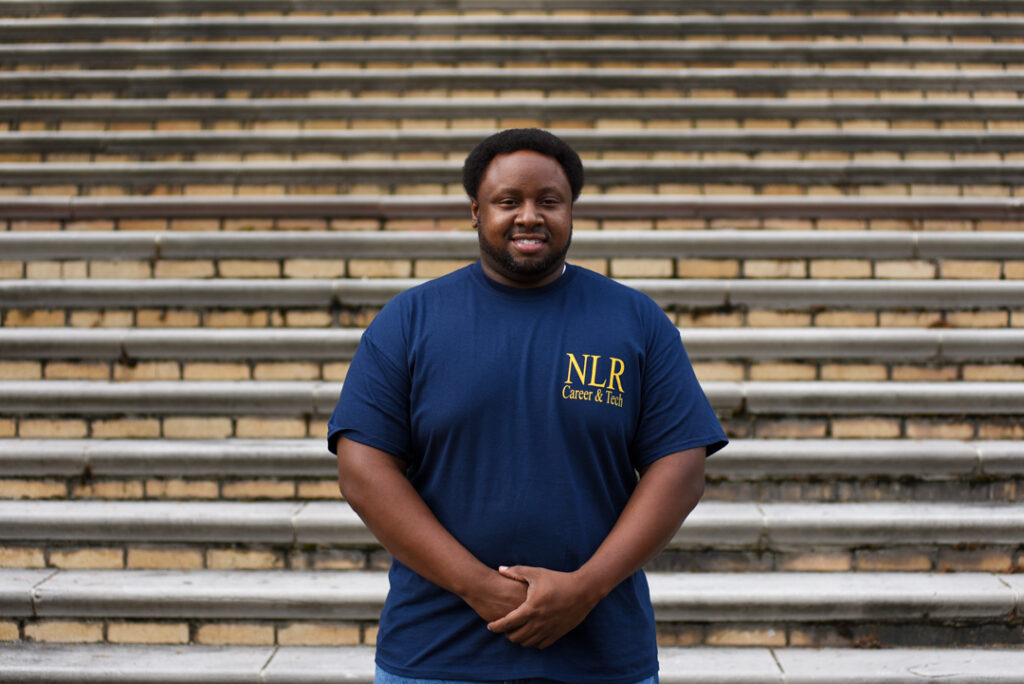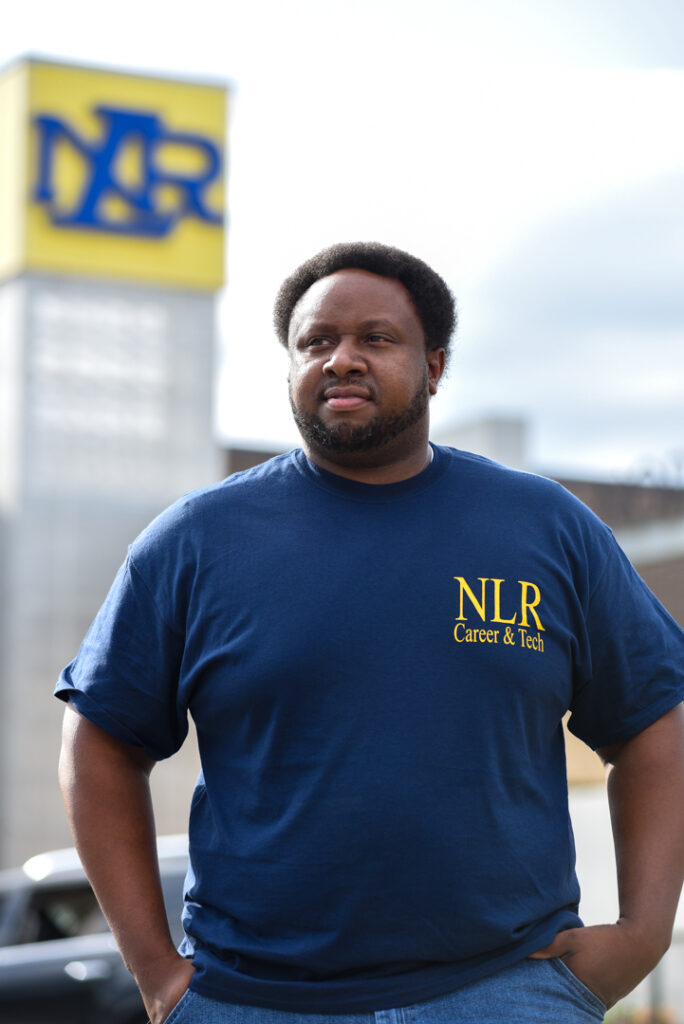 From construction to career tech teacher and local president
From construction to career tech teacher and local president
Alternative just means another way, says Patrick Bruce, a North Little Rock teacher who began his non-traditional education career in the district’s alternative school, North Little Rock Academy.
“Alternative schools always get a bad rap and they really shouldn’t,” Bruce said. “People always want to say, ‘Well those are the kids with the behavior problems,’ but a lot of the time these are the kids that are so gifted that the traditional classroom cannot service them. It’s simply another way to get our students to engage in the learning.”
Bruce also took an alternative path to the classroom, beginning in the newly remodeled den of a North Little Rock administrator. After completing the construction work, Bruce says he was offered another job.
“He said, ‘Hey, have you ever thought about teaching a shop class? My kids could really benefit from what you’re doing,’” Bruce recalled.
At the time, Bruce was working in construction and adjunct teaching for an online college. He turned down the offer at first, but after he was called back for a second home renovation project the principal sold him on the opportunity to teach manufacturing.
“Even though my background was in construction, a lot of the fundamentals are the same, a lot of your hand tools, your power tools, ethics, interview skills,” Bruce said. “It wasn’t much of a transition for me to be able to teach that.”
Bruce calls his 3 years at the alternative school an incredible experience where he was able to watch students immediately benefit from the knowledge he shared.
“We built benches,” he said. “We refinished furniture. We did all kinds of small hands-on projects that gave the kids experience and it’s kind of a lost class time. Thirty years, forty years ago it was not uncommon to have a shop class, but now it’s rare.”
In addition to a degree in business management and a master’s in finance, Bruce had experience teaching online. While he’d never been in charge of a K-12 classroom, he was able to bring another concept over from his days in construction.
“In the construction industry you’re used to working in teams,” he said. “You may have 5 different personalities on a crew. Well you can have 30 different personalities in a classroom. It’s not always about the content that you teach; it’s about the relationships you grow. These are the kids who need someone to hear them out and create an environment that’s beneficial to them.”
Because he grew up in North Little Rock and knew the lay of the land, Bruce says he could understand where the kids were coming from.
“If you can build a relationship with your student, that student is more likely to listen to you when something is going on, when someone is making them mad, when they’re having an issue at home,” he said. “They’re willing to come to you to say, ‘This is my issue: I’m having a bad day.’ I’ll say ‘Ok, go over and chill out for today; we’ll come back to you if something is going on that makes you feel better.”
After 3 years at the alternative school, Bruce is now working at the district’s Center of Excellence, a conversion school inside North Little Rock High School. He says the main difference between the two schools is facilities and funding.
“I have more resources to work with, but the kids are pretty well the same,” Bruce said. “A lot of them are hands on… they’re kinesthetic learners. It’s the access to more opportunities there because when you’re in alternative school there’s that stigma that comes along with it that should not be there.”
The school also offers a chance to work with teachers and students in other “professions” to complete projects from start to finish.



Bruce gets to watch students realize information they learn in the classroom can be applied in the real world. The hands-on courses are a way to address the nation’s skills gap while showing students alternative career paths.
“People don’t know how to do anything anymore and so we buy things from overseas,” Bruce said. “I see what I’m doing as a way of building the skills gap that we have in America and especially right here in central Arkansas.”
That gap isn’t just related to industry. Bruce once taught a senior student who asked how to change a tire.
“He didn’t want to be embarrassed by what he thought he should know that he had not been taught,” Bruce said. “That’s a sense of pride, of accomplishment.”
And another student took his bench building lessons in an entrepreneurial direction.
“She went and bought a saw and she started building benches and selling them,” he said. “It was a way for her to add income immediately. She went from, ‘I don’t know if I can do this’ to actually becoming an independent business owner.”
Seeing these kinds of instant results feels amazing, Bruce says while referencing the powerful resources found in Wakanda, from the Black Panther comic and movie.
“That’s why I say teachers are superheroes,” Bruce said. “We’re able to actually give kids power. The information we teach, that’s their Vibranium. It turns them into something they were not beforehand.”
He also says educators’ power comes from collective action. Bruce joined AEA as soon as he entered the classroom, following in the footsteps of the teachers he clearly remembers from his days as a student in the Pulaski County Special School District.
“I remember back in the mid-90s when the strike went on,” Bruce said. “I remember hearing a lot of my parents’ friends talk about the union. When you become a teacher, you join the union because that’s where your strength is.”
In addition to amplifying educator voice, the AEA provides an opportunity to connect with other more experienced colleagues from across the state.
“It’s about being able to share experiences and learn from those who have been before you that can tell you, ‘OK hey, this is a lesson plan. This is classroom management,’” he said. “Sometimes you may have what it takes, but you need to be polished. The union offers that, and AEA is it. I’ve seen that major difference of what AEA can do for a person’s professional life.”
Bruce is now serving as President of the North Little Rock CTAESP during a challenging period. The pandemic has brought a whole new series of issues at a time when district administration is also going through changes.
“As a local association, you benefit from building strong relationships,” Bruce said. “You have to really interact with the decision makers in your district, so when you have a high turnover of decisionmakers, you have to make sure you are consistent. You have to make sure you are constant.”
While he ensures administrators know what the association does and what its members stand for, he also must work to make sure educators’ voices and concerns are considered in reopening plans and decisions.
“It makes it very hard because no one has been through this before,” he said. “Educators don’t want to be exposed in any way that could harm themselves or their families. They want to make sure the kids and co-workers are safe, and also they want security in knowing they do have a job even if we go virtual.”
He relies on the relationships he’s built through the association to see how other locals are responding and to be on the lookout for other issues that may need attention.
“AEA provides that camaraderie, meeting people from across the state and hearing their experiences, finding out the issues they have that we may not have yet, but could be coming our way and vice versa,” he said. “It’s a great way to interact with other educators in a very positive manner.”
Read the full issue HERE!




